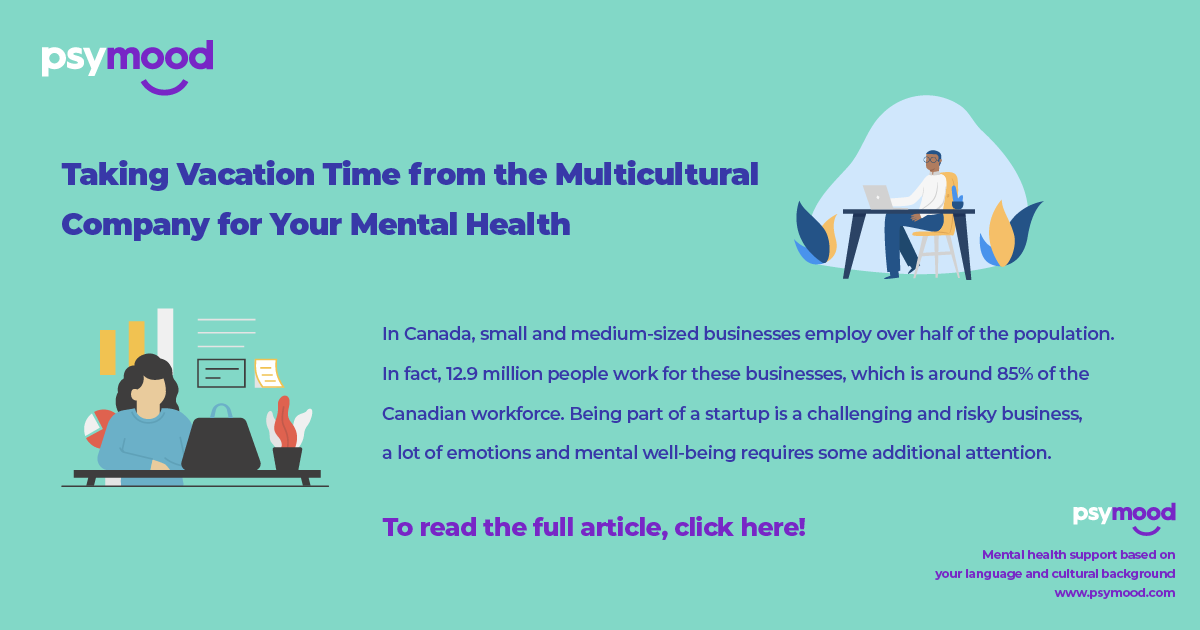Startups Need to Prioritize the Mental Well-being of the Multicultural Workforce
In Canada, small and medium-sized businesses employ over half of the population. In fact, 12.9 million people work for these businesses, which is around 85% of the Canadian workforce. According to startup survival rate stats, 70.4% of Canadian micro-enterprises survive after five years on the market (The Balance SMB.) PsyMood is also a Canadian multicultural startup and they take pride in the mental well-being of its employees. In general, being part of a startup is a challenging and risky business, a lot of emotions and mental well-being requires some additional attention. Here are some things to consider when prioritizing the mental well-being of a multicultural startup.
Build an Inclusive Culture
It is important for startups to give priority to creating a culture that is inclusive and welcoming for employees from different backgrounds. This can be achieved by promoting workplace diversity, equity, and inclusion, celebrating cultural events, and creating a sense of belonging for all employees.
Create Open Communication
Startups should encourage their employees to speak up about their mental health concerns without fear of judgment or retaliation. This can be achieved by providing a safe and confidential space for employees to talk about their feelings and thoughts. Founders and managers can set the tone by taking care of their own mental health and modelling healthy behaviours.
Provide flexibility and Encourage Work-life balance
The perks of being a startup company are that they can offer flexible work arrangements such as remote work, flexible hours, or time off to help employees manage their work and personal responsibilities. Some great tips can be promoting healthy habits such as exercise, meditation, and taking breaks during the workday.
Foster a Sense of Community
Create opportunities for employees to connect and build relationships. This can include organizing cultural events, supporting employee resource groups, and providing mentorship and networking opportunities. Creating a supportive community can help employees feel valued and connected, improving their mental well-being.
Recognize and Celebrate Achievements
Recognizing and celebrating achievements boost morale and motivation. A simple kudos during a virtual group meeting can help employees feel valued and appreciated, improving their mental well-being.
Cross-Cultural Training
Cross-cultural training is particularly important in multicultural work environments where individuals need to interact with people from different cultures, as it can help reduce misunderstandings and conflicts, which can contribute to stress and anxiety among employees. Not all startups may have the budget for this, but consider having a virtual party with an open dialogue about cultures and traditions within the company. Participants can learn to be aware of their own biases and assumptions and develop empathy for people from different cultures. Any education will promote collaboration and productivity within the workplace.
Offer Mental Health support that is Culturally Sensitive
Startups can provide mental health resources that are tailored to the cultural backgrounds and diverse needs of their employees. Did you know that PsyMood is an online mental health platform that helps connect people to specialists in multiple languages and part of different cultures? Partnering with a platform, like ours, can be a solution to your diverse startup.
PsyMood is a digital tool designed to help you find the support you need in the language that you are most comfortable with. PsyMood considers cultural background, geographical location, interests, and personal needs, amongst other factors, to pair you with service providers for either online or in-person therapy sessions.


.png)
.png)
.png)
Recent Comments